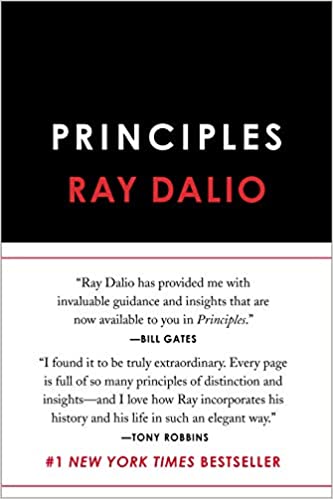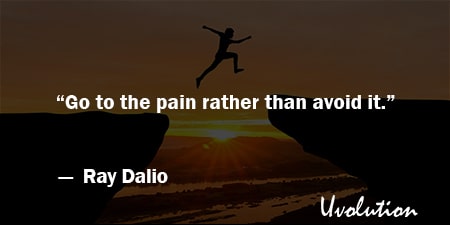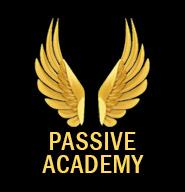Principles by Ray Dalio Book Summary
The Book in 1 Sentences
“Before I begin telling you what I think, I want to establish that I’m a ‘dumb shit’ who doesn’t know much relative to what I need to know. Whatever success I’ve had in life has had more to do with my knowing how to deal with not knowing than anything I know.
The most important thing I learned is an approach to life based on principles that help me find out what’s true and what to do about it. I’m passing along these principles because I am now at the stage in my life in which I want to help others be successful rather than to be more successful myself.
Because these principles have helped me and others so much, I want to share them with you. It’s up to you to decide how valuable they really are and what, if anything, you want to do with them.” ~ Ray Dalio
6 BIG Ideas
1. Strive for a lot and fail well
2. Meaningful work and meaningful relationships
4. Principle #1: “Embrace Reality and Deal with It.”
5. Principle #2: The 5-Step Process to Get What You Want in Life
Principles: Life and Work Book Summary
1. Strive for a lot and fail well
“I learned my principles over a lifetime of making a lot of mistakes and spending a lot of time reflecting on them. Since I was a kid, I’ve been a curious, independent thinker who ran after
audacious goals.
I got excited about visualizing things to go after, had some painful failures going after them, learned principles that would prevent me from making the same sort of mistakes again, and changed and improved, which allowed me to imagine and go after even more audacious goals and do that rapidly and repeatedly for a long time. ...
I believe that the key to success lies in knowing how to both strive for a lot and fail well. By failing well, I mean being able to experience painful failures that provide big learnings without
failing badly enough to get knocked out of the game.”
“Over the years that followed, I found that most of the extraordinarily successful people I’ve met had similar big painful failures that taught them the lessons that ultimately helped them succeed.
Looking back on getting fired from Apple in 1985, Steve Jobs said, ‘It was awful tasting medicine, but I guess the patient needed it. Sometimes life hits you in the head with a brick. Don’t lose faith. I’m convinced that the only thing that kept me going was that I loved what I did.’
I saw that to do exceptionally well you have to push your limits and that, if you push your limits, you will crash and it will hurt a lot. You will think you have failed—but that won’t be
true unless you give up.
Believe it or not, your pain will fade and you will have many other opportunities ahead of you, though you might not see them at the time. The most important thing you can do is to gather the lessons these failures provide and gain humility and radical open-mindedness in order to increase your chances of success. Then you press on.”
“Go to the pain rather than avoid it. If you don’t let up on yourself and instead become comfortable always operating with some level of pain, you will evolve at a faster pace. That’s just the way it is.”
2. Meaningful work and meaningful relationships
“While making money was good, having meaningful work and meaningful relationships was far better. To me, meaningful work is being on a mission I become engrossed in, and meaningful relationships are those I have with people I care deeply about and who care deeply about me.
Think about it: It’s senseless to have making money as your goal as money has no intrinsic value—its value comes from what it can buy, and it can’t buy everything. It’s smarter to start with what you really want, which are your real goals, and then work back to what you need to attain them.
Money will be one of the things you need, but it’s not the only one and certainly not the most important one once you get past having the amount you need to get what you really want.
When thinking about the things you really want, it pays to think of their relative values so you weigh them properly. In my case, I wanted meaningful work and meaningful relationships
equally, and I valued money less—as long as I had enough to take care of my basic needs.
In thinking about the relative importance of great relationships and money, it was clear that
relationships were more important because there is no amount of money I would take in exchange for a meaningful relationship, because there is nothing I could buy with that money
that would be more valuable.
So, for me, meaningful work and meaningful relationships were and still are my primary goals and everything I did was for them. Making money was an incidental consequence of that.”
“Learning to meditate helped too. When the Beatles visited India in 1968 to study Transcendental Meditation at the ashram of Maharishi Mahesh Yogi, I was curious to learn it, so I did. I loved it.
Meditation has benefited me hugely throughout my life because it produces a calm open-mindedness that allows me to think more clearly and creatively. ”
“Imagine that in order to have a great life you have to cross a dangerous jungle. You can stay safe where you are and have an ordinary life, or you can risk crossing the jungle to have a terrific life.
How would you approach that choice? Take a moment to think about it because it is the sort of choice that, in one form or another, we all have to make.”
3. The Shapers
“Then I spoke with proven shapers I knew—Bill Gates, Elon Musk, Reed Hastings, Muhammad
Yunus, Geoffrey Canada, Jack Dorsey (of Twitter), David Kelly (of IDEO), and more. They had
all visualized remarkable concepts and built organizations to actualize them, and done that
repeatedly and over long periods of time. ...
It turns out they have a lot in common. They are all independent thinkers who do not let
anything or anyone stand in the way of achieving their audacious goals. They have very strong mental maps of how things should be done, and at the same time a willingness to test those mental maps in the world of reality and change the ways they do things to make them work better.
They are extremely resilient, because their need to achieve what they envision is stronger
than the pain they experience as they struggle to achieve it. Perhaps most interesting, they have a wider range of vision than most people, either because they have that vision themselves or because they know how to get it from others who can see what they can’t.
All are able to see both the big pictures and the granular details (and levels in between) and synthesize the perspectives they gain at those different levels. They are simultaneously creative, systematic, and practical.
They are assertive and open-minded at the same time. Above all, they are passionate about what they are doing, intolerant of people who work for them who aren’t excellent at what they do, and want to have a big, beneficial impact on the world.”
“When faced with a choice between achieving their goal or pleasing (or not disappointing)
others, they [shapers] would choose achieving their goal every time.”
“I’ve always been an independent thinker inclined to take risks in search of rewards—not just in the markets, but in most everything. I also feared boredom and mediocrity much more than I feared failure.
For me, great is better than terrible, and terrible is better than mediocre, because terrible at least gives life flavor.”
4. Principle #1: “Embrace Reality and Deal with It.”
“Learning how reality works, visualizing the things I want to create, and then building them
out is incredibly exciting for me. Stretching for big goals puts me in the position of failing
and needing to learn and come up with new inventions in order to move forward.
I find it exhilarating being caught up in the feedback loop of rapid learning—just as a surfer loves riding a wave, even though sometimes it leads to crashes. Don’t get me wrong, I’m still scared of the crashes and I still find them painful.
But I keep that pain in perspective, knowing that I will get through these setbacks, and that most of my learning will come from reflecting on them. Just as long-distance runners push through pain to experience the pleasure of ‘runner’s high,’ I have largely gotten past the pain of my mistake making and instead enjoy the pleasure that comes with learning from it.
I believe that with practice you can change your habits and experience the same ‘mistake learner’s high.’”
Sub-principle 1.1: “Be a hyperrealist.”
Dalio says: “I have become so much of a hyperrealist that I’ve learned to appreciate the beauty of all realities, even harsh ones, and have come to despise impractical idealism.”
“My point is that people who create great things aren’t idle dreamers: They are totally grounded in reality. Being hyperrealistic will help you choose your dreams wisely and then achieve them.”
“Dreams + Reality + Determination = A Successful Life.”
5. Principle #2: The 5-Step Process to Get What You Want in Life
“It seems to me that the personal evolutionary process—the looping I described in the last
chapter—takes place in five distinct steps. If you can do those five things well, you will almost
certainly be successful. Here they are in a nutshell:
1. Have clear goals.
2. Identify and don’t tolerate the problems that stand in the way of your achieving those goals.
3. Accurately diagnose the problems to get at their root causes.
4. Design plans that will get you around them.
5. Do what’s necessary to push these designs through to results.”
Goals + Problems + Diagnosis + Design + Doing.
6. Principle #5: “Learn How to Make Decisions Effectively.”
“The concept of artificial intelligence is not new. Even back in the 1970s, when I first started
experimenting with computerized decision making, it had already been around for nearly twenty years (the term ‘artificial intelligence’ was first introduced in 1956 at a conference at Dartmouth College). While a lot has changed since then, the basic concepts remain the same.
To give you just one ultrasimple example of how computerized decision making works, let’s
say you have two principles for heating your home: You want to turn the heat on when the
temperature falls below 68 and you want to turn the heat off between midnight and 5:00 a.m.
You can express the relationship between these criteria in a simple decision-making formula:
If the temperature is less than 68 degrees and the time is not between 5:00 a.m. and midnight,
then turn on the heat.
By gathering many such formulas, it’s possible to create a decision-making system that takes in data, applies and weighs the relevant criteria, and recommends a decision.”
“Your children and their peers must learn to speak this language [Algorithms] because it will soon be as important or more important than any other language.”
“In a nutshell, learning how to make decisions in the best possible way and learning to have the courage to make them comes from
a) going after what you want,
b) failing and reflecting well through radical open-mindedness,
and c) changing/ evolving to become more capable and less fearful.”
“Think for yourself to decide
1) what you want,
2) what is true, and
3) what you should do to achieve #1 in light of #2, and do that with humility and open-mindedness so that you consider the best thinking available to you.”
“If you’ve learned anything from this book I hope it’s that everyone has strengths and weaknesses, and everyone has an important role to play in life. Nature made everything
and everyone for a purpose.
The courage that’s needed the most isn’t the kind that drives you to prevail over others, but the kind that allows you to be true to your truest self, no matter what other people want you to be.”
That was my QUICK summary of the great book Principles by Ray Dalio. If you’re interested, get your copy. There is a HUGE amount of life-changing ideas in this book, and we’ve only touched on a tiny bit of it.
Buy The Book: Principles by Ray Dalio

GET Blinkist 7 Days FREE Trial
3000+ Book Summaries
(Audio and Text)








